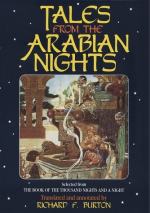[FN#290] In text “Al-Bulaybul” (the little Nightingale, Philomelet) “Al Sayyah” (the Shrieker). The latter epithet suggests to me the German novel which begins, “We are in Italy where roses bestink the day and Nightingales howl through the live-long night,” &c.
[FN#291] “Sanjak,” Turk. = flag, banner, and here used (as in vulg. Arab.) for Sanjak-dar, the banner-bearer, ensign. In mod. parlance, Sanjak = minor province, of which sundry are included in an “Iyalah” = government-general, under the rule of a Wali (Wilayah).
[FN#292] In the Ms. “Zifr” = nail, claw, talon.
[FN#293] “Al-Rizk maksum,” an old and sage byword pregnant with significance: compare “Al-Khauf (fear) maksum” = cowardice is equally divided. Vol. iii. 173. [I read: “Yas’a ’l-Kadamu li-’Umrin dana au li-Rizkin qusima,” taking “Rizk” as an equivalent for “al-Rizku ’l-hasanu” = any good thing which a man obtains without exerting himself in seeking for it, and the passive “qusima” in the sense of Kismah, vulgo “Kismet.” Hence I would translate: The foot speeds to a life that is mean, or to a boon that is pre-ordained.-St.]
[FN#294] In the text “Bat” (for Bit), in Fellah-speech “Pass the night here!” The Bird thus makes appeal to the honour and hospitality of his would-be captor, and punishes him if he consent. I have translated after Scott (v. 161). [I cannot persuade myself to take “bat” for an imperative, which would rather be “bit” for “bit,” as we shall find “kum” for “kum,” “ruh” for “ruh.” It seems to me that the preterite “bat” means here “the night has passed,” and rendering “man” by the interrogative, I would translate: “O! who shall say to the sad, the separated, night is over?” Complaints of the length of night are frequent with the parted in Arab poetry. This accords also better with the following ’Atus al-Shams, the sneezing of the sun, which to my knowledge, applies only to daybreak, as in Hariri’s 15th Assembly (al-Farziyah), where “the nose of the morning” sneezes.—St.]
[FN#295] i.e., they bound kerchiefs stained blue or almost black round their brows. In modern days Fellah women stain their veils (face and head), kerchiefs and shirts with indigo; and some colour their forearms to the elbow.
[FN#296] Here again and in the following adventure we have “Khudadad and his Brothers.” Suppl. vol. iii. 145-174.
[FN#297] In sign of despair. See vol. i. 298.
[FN#298] In text “Kalamatu ’llah” = the Koran: and the quotation is from chapt. cxiii. 5. For the “Two Refuge-takings” (Al-Mu’awizzatani), see vol. iii. 222.
[FN#299] i.e., caused his brothers to recover life. [I read: Allazi ’amaltu fi-him natijah yujazuni bi-Ziddi-ha = Those to whom I did a good turn, requite me with the contrary thereof. Allazi, originally the masc. Sing. is in this Ms. vulgarly, like its still more vulgar later contraction, “illi,” used for both genders and the three numbers.—St.]




